The Obi of Onitsha, His Royal Majesty Nnaemeka Achebe, has urged the political class and leaders in various positions to prioritize the public interest over personal and self-centred agendas if Nigeria is to progress beyond its current state.
In his goodwill message delivered yesterday in Abuja during the public presentation of Senator Chris Anyanwu’s book Bold Leap, His Royal Majesty cautioned that the rising level of corruption in the country, likened to over-milking a cow, could lead to the cow’s demise if the corrupt practices are not curbed.
He expressed regret over the lack of sincerity demonstrated by the political class toward accountability and good governance, comparing it to the reckless habit of incessantly milking a cow without replenishing or sustaining its health.
Bold Leap, a 600-page autobiography of Senator Chris Anyanwu, featuring three parts and 19 chapters, brought together an esteemed gathering of Nigerians, including former Presidents, past and present Senate Presidents, senators, and former governors.
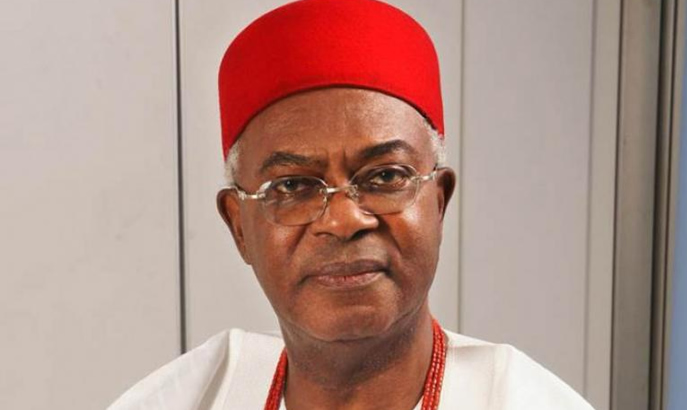
Bola Tinubu was represented by the Minister of Special Duties and Inter-Governmental Affairs, Zaphaniah Jisalo. The event’s chairman, former President Olusegun Obasanjo, was represented by Senator David Mark, a former Senate President.
Former President Goodluck Jonathan was represented by Senator Anyim Pius Anyim, also a former Senate President. Other notable attendees included the Emir of Kano, Sanusi Lamido Sanusi; the Jaja of Opobo; former Anambra State Governors Chris Ngige and Peter Obi; PANDEF spokesperson Dr. Obiuwevbi Ominimini; as well as senators, captains of industry, and other dignitaries.
The Obi of Onitsha said: “Should we continue milking the cow, it will die. In this country, since independence, we’ve been talking and talking and talking and talking and talking. I think it’s time we begin to think about doing something because we have two alternatives. Keep milking the cow until it dies, because of our sectional interests, which we tend to protect, and our personal interests. People go into public service, not to serve the public, but to serve their interests.
“Either we keep doing that and milk the cow to death, or we do the opposite and place Nigeria above everything else.
“And I would like to add that time is not too much in our favour. It’s either we milk the cow to death very, very fast, or we can turn around the country very, very fast.”
Speaking on “How Do We Fix Nigeria-System, Structure, Institutions and Leadership?: A Panel Discussion,” former Ekiti State governor, Dr. Kayode Fayemi, who was one of the four panellists, tongue lashed the political class, describing the current political and governance system as operational in Nigeria as “electorialism” and not democracy.
Fayemi, who served as Minister of Solid Minerals during the administration of President Muhamnadu Buhari, said: “On the systemic issues we have to confront, beyond going into the nature of the system we are operating, liberal democracy, parliamentary or presidential system, who cuts the substance of the question you ask? For me, the excuses are always going to be legit, why we are not operating right as a country. Is it the system, the institutions, or the leadership, or in fact, some would even say colonialism, because we must provide our own foundation. That’s why we have found ourselves in that situation.
“We have been fighting to forge what in political science we call elite consensus, but we need to go beyond elite consensus to national consensus and how do we get to national consensus without asking the national question, which is, who are we? What do we want for ourselves? Where do we want the country to be in 10 years, or 20 years, or 50 years? Every country that wants to really develop starts with a national vision and mission.”
Briggs, who advocated the restructuring of the political system, said: “We need to restructure our political system. We need to restructure the people we put in politics to represent us. And we have a problem with that. The problem originates from the Independent National Election Commission, INEC. INEC has let Nigerians down.
“I’m one of those Nigerians that INEC has let down. When you have a voters card and you cannot vote, it means that you’re not choosing the people who are representing you. Therefore, they owe you nothing. We are at the very worst stage that we can be as a nation. Patriotism is not the national anthem. A lot of people can’t even sing all the verses of either of the national anthems.
“So, patriotism is about what you do for your country, but specifically what it is that your country is also doing for you because you are. We’re all Nigerians. We’re not Ghanaians. We’re not British. We’re Nigerians. So, a country is to give and the citizens are also to give.”
She also described as a great error that activists and those who fought for democracy left the politicians to run the show.
“So if we are to succeed, then we must, as a people, as the electorate, make the decision as to who are these people that we are going to put in the position of power that we are investing in them to hold for us in trust, to make the right decisions and make the right policies for Nigerians. I have just one example which will tell us where we need to go.”
Senator Enyinnaya Abaribe emphasized the importance of placing the right individuals in the right positions and criticized the weakness of institutional systems. He highlighted an example where a public official prosecuted for embezzlement faced only minimal consequences, describing it as merely “a slap on the wrist.”
He said: “Last week, the former head of the police pension fund embezzled, according to the court, N23.2 billion. He was tried by the court and the court fined him N323 million and then imposed a two-year sentence on him for which he also gave, at the same time that they imposed that two-year sentence, a fine of N250,000, so that he can go free. So, someone embezzles N23 billion, then he wakes up and pays back N315 million and he works free to now take N22 billion and walk away.
“Now, we are talking about an illegal institution versus the person who was imposing that sentence. So, as far as I’m concerned, if we don’t have the right people, we will never get an institution right. And that is the only way we can go forward.”
On his part, Dr. Aminu Gamana, who noted that the country needed value reorientation, said: “We need societal reorientation in order to get things right. Otherwise, you will conduct elections every four years, people will come out and collect indomie or spaghetti and vote for someone who does not care about them.”
Follow Parallel Facts on WhatsApp Channel: https://whatsapp.com/channel/0029VaCQSAoHgZWiDjR3Kn2E



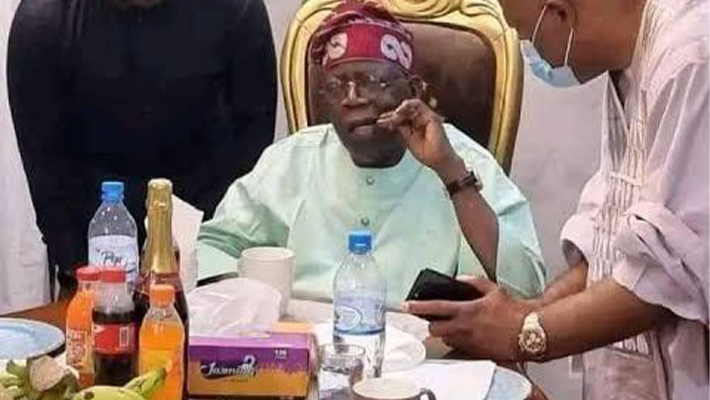
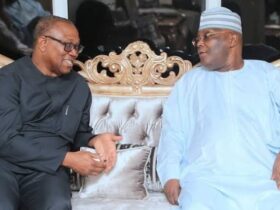
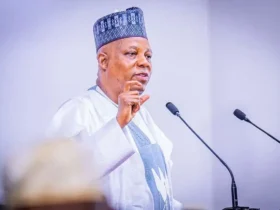

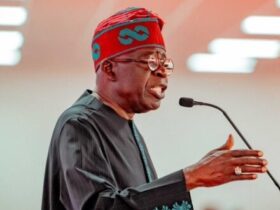
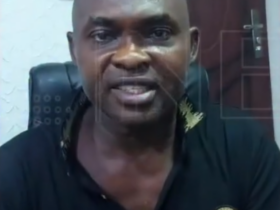
Leave a Reply